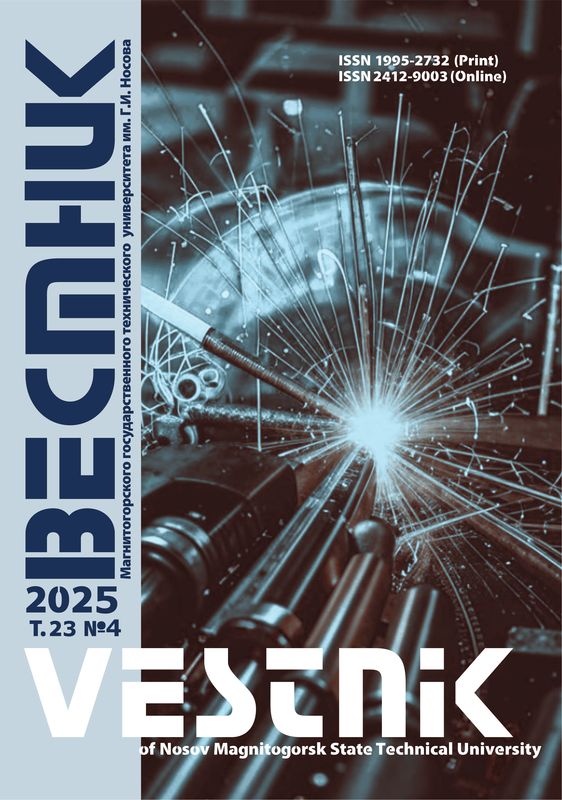DOI: 10.18503/1995-2732-2021-19-3-84-89
Abstract
The issues of ensuring a set level of consumer properties of new and conventional types of products by efficient quality management in treatment processes are vital for metalware plants. When designing technological processes of metalware production, there are always noise factors, such as inaccurate initial data associated with the uncertainty of ambient conditions, a varying quality of raw materials, and imperfection of technological equipment. In this regard, an urgent issue is to develop a methodology for designing the processes of manufacturing metalware, taking into account parameter uncertainty of initial data. Now, one of the actively developing priorities is a robust parameter design. The use of robust optimization makes it possible to develop a technology that is insensitive to variations of noise factors. The method is based on using orthogonal matrices, representing a minimum set of experiments with various combinations of levels of parameters. A robust experiment is associated with two matrices: a matrix of control parameters and a matrix of noise factors. The paper describes a suggested methodology of designing new and improving existing technological processes of metalware production using robust optimization. This procedure may be applied both for designing a new technology and improving the existing one. To reduce quality indicators to a single objective function, a grey relational analysis (GRA) is used. This is a method of analyzing the degree and level of correlation between different parameters for their discrete sequence. A robust approach may be efficiently applied for developing new and improving existing processes of manufacturing metalware. A practical application of this methodology will significantly reduce time required to work out technological solutions for ensuring a set level of quality of finished products.
Keywords
Metalware production, robust optimization, robustness, robust experiment, noise factors, quality indicators, ANOVA, GRA.
For citation
Pivovarova K.G. Metalware Quality Management Based on a Robust Parameter Design. Vestnik Magnitogorskogo Gosudarstvennogo Tekhnicheskogo Universiteta im. G.I. Nosova [Vestnik of Nosov Magnitogorsk State Technical University]. 2021, vol. 19, no. 3, pp. 84–89. https://doi.org/10.18503/1995-2732-2021-19-3-84-89
1. Korchunov A.G., Chukin M.V., Gun G.S., Polyakova M.A. Upravlenie kachestvom produktsii v tekhnologiyakh metiznogo proizvodstva: monografiya [Product quality management in metalware production technologies: monograph]. Moscow: Ore and metals, 2012, 164 p. (In Russ.)
2. Pivovarova K.G., Korchunov A.G. Methodology for managing quality indicators of hardware products with elements of robust design. Chernye Metally. 2020, issue 12, pp. 38-43. doi: 10.17580/chm.2020.12.05
3. Korchunov A.G., Lysenin A.V. Metalware quality management in conditions of uncertain process information. Vestnik Magnitogorskogo gosudarstvennogo tekhnicheskogo universiteta im. G.I. Nosova [Vestnik of Nosov Magnitogorsk State Technical University], 2012, vol. 39, no. 3, pp. 45-48. (In Russ.)
4. Kirin Yu.P., Kiryanov V.V. Robust management of sponge titanium production processes. Nauchno-tekhnicheskiy vestnik Povolzhya [Scientific and Technical Volga Region Bulletin], 2016, no. 2. pp. 120-123. (In Russ.)
5. Feng S., Tesi P. Resilient control under denial-of-service: Robust design. Automatica. 2017, vol. 79, pp. 42-51. doi:10.1016/j.automatica.2017.01.031
6. Bertsimas D., Gupta V., Kallus N. Data-driven robust optimization. Mathematical Programming. 2018, vol. 167, pp. 235-292. doi:10.1007/s10107-017-1125-8
7. Amit Kaushal, Rajath Alexander, P.T. Rao, Jyoti Prakash, Kinshuk Dasgupta. Artificial neural network, Pareto optimization, and Taguchi analysis for the synthesis of single-walled carbon nanotubes. Carbon Trends. 2021, vol. 2, 10016. doi:10.1016/j.cartre.2020.100016
8. Varzhapetyan A.G. Sovremennye instrumenty menedzhmenta kachestva. Robastnoe proektirovanie: uchebnoe posobie [Modern quality management tools. Robust design: a textbook]. Saint Petersburg: GUAP, 2008, 172 p. (In Russ.)
9. Ghalme S., Mankar A., Bhalerao Y. Integrated Taguchi-simulated annealing (SA) approach for analyzing wear behaviour of silicon nitride. Journal of Applied Research and Technology. 2019, vol. 15, no. 6, pp. 624-632. doi: 10.1016/j.jart.2017.08.003
10. Alsaadi N., Sheeraz M. A. Design and optimization of bimorph energy harvester based on Taguchi and ANOVA approaches. Alexandria Engineering Journal. 2020, vol. 59, issue 1, pp. 117-127. doi:10.1016/j.aej.2019.12.016
11. Agboola O.O., Ikubanni P.P., Adeleke A.A., Adediran A.A., Adesina O.S., Aliyu S.J., Olabamiji T.S. Optimization of heat treatment parameters of medium carbon steel quenched in different media using Taguchi method and grey relational analysis. Heliyon. 2020, vol. 6, issue 7, e04444. doi:10.1016/j.heliyon.2020.e04444
12. Umamaheswarrao P., Ranga Raju D., Suman KNS, Ravi Sankar B. Multi objective optimization of process parameters for hard turning of AISI 52100 steel using Hybrid GRA-PCA. Procedia Computer Science. 2018, vol. 133, pp. 703-710. doi:10.1016/j.procs.2018.07.129
13. Naqiuddin N.H., Saw L.H., Yew M.C., Yusof F., Poon H.M., Cai Z., Thiam H.S. Numerical investigation for optimizing segmented micro-channel heat sink by Taguchi-Grey method. Applied Energy. 2018, vol. 222, pp. 437-450. doi:10.1016/j.apenergy.2018.03.186
14. Das M.K., Kumar K., Barman T.Kr., Sahoo P. Optimization of surface roughness and MRR in electrochemical machining of EN31 tool steel using grey-Taguchi approach. Procedia Materials Science. 2014, vol. 6, pp. 729-740. doi: 10.1016/j.mspro.2014.07.089












